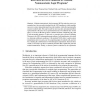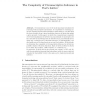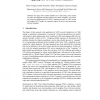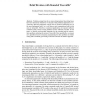LPNMR
2009
Springer
15 years 7 months ago
2009
Springer
We consider random logic programs with two-literal rules and study their properties. In particular, we obtain results on the probability that random “sparse” and “dense” pr...
LPNMR
2009
Springer
15 years 7 months ago
2009
Springer
Modular nonmonotonic logic programs (MLPs) under the answer-set semantics have been recently introduced as an ASP formalism in which modules can receive context-dependent input fro...
95
Voted
LPNMR
2009
Springer
15 years 7 months ago
2009
Springer
Circumscription is one of the most important formalisms for reasoning with incomplete information. It is equivalent to reasoning under the extended closed world assumption, which a...
73
Voted
LPNMR
2009
Springer
15 years 7 months ago
2009
Springer
74
Voted
LPNMR
2009
Springer
15 years 7 months ago
2009
Springer
Building upon the 2-valued Layered Models semantics for normal programs, we introduce a refinement — the Layer Supported Models semantics — which, besides keeping all of LMs�...
81
Voted
LPNMR
2009
Springer
15 years 7 months ago
2009
Springer
LPNMR
2009
Springer
15 years 7 months ago
2009
Springer
We report on recent advancements in the development of grounder Gringo for logic programs under answer set semantics. Like its relatives, DLV and Lparse, Gringo has in the meantime...
98
Voted
LPNMR
2009
Springer
15 years 7 months ago
2009
Springer
We apply ASP to model validation in a CASE setting, where models are UML class diagrams and object diagrams are called “snapshots”. We present the design and implementation of ...
117
Voted
LPNMR
2009
Springer
15 years 7 months ago
2009
Springer
Abstract. In answer-set programming (ASP), many notions of program equivalence have been introduced and formally analysed. A particular line of research in this direction aims at s...
92
Voted
LPNMR
2009
Springer
15 years 7 months ago
2009
Springer
Problems arising from the revision of propositional knowledge bases have been intensively studied for two decades. Many different approaches to revision have thus been suggested, w...




